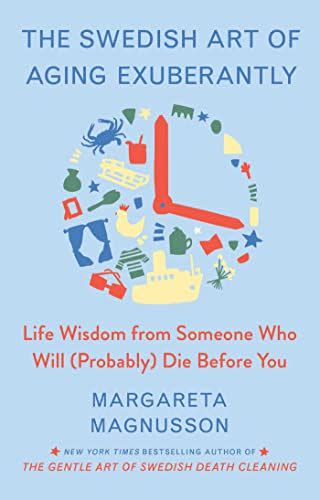The Swedish Secret to a Decluttered Life

"Hearst Magazines and Yahoo may earn commission or revenue on some items through the links below."
A very clever woman I know—or knew, as she passed away some time ago—had a natural tidiness about her. Her name was Birgitta, and she was the owner of the Gothenburg art gallery where I had my first exhibition in the late 1970s.
People were always dropping in and out to look at her artists’ works. To the left of the entrance to Birgitta’s art space there was a big table made of light brown marble looking like toasted meringue, a table around which the cultural celebrities of Gothenburg (there were not many; Gothenburg is not a big city) would gather to have coffee, drink sherry, talk art, and argue politics all through the day and night. I did not participate in the nighttime sessions—I was a square with five children—but I do know that Birgitta had a slogan she would softly shout at anyone who stood up to go to the bathroom, or to go to her little kitchen to get a snack or more sherry: “Don’t leave empty-handed [Gå inte tomhänt]!”
Birgitta was not instructing her guests to pluck pieces of art from the walls and take them home. She simply wanted everyone to help clean the table bit by bit as the day turned into night. Since they were going inside anyway, they could help by taking something with them. Her gentle order was simple, friendly logic. She said it to everyone, from the CEO of Volvo to the head of the Gothenburg art museum, from her interns to her artists. All were asked. Nobody protested. Everyone helped.
I saw how her slogan was very effective, and so I started practicing her technique with my children at home. In no time at all, it was part of our daily routine—and it wasn’t just for clearing the dinner table.
I think the principle of not leaving empty-handed can be applied everywhere you go in life. If there are dirty clothes on your bedroom floor and you pass the laundry basket empty-handed, that is not clever. The pile will only get bigger. Don’t leave empty-handed. When heading out the front door, take the garbage with you. Don’t leave empty-handed.
The more I’ve thought about it, the more I realize that Birgitta’s simple saying could apply to almost any situation in life. Sure, as I’ve said before, when you leave Earth, make sure there is not a bunch of your crap still here for someone else to deal with after you go.
But also, while you are still on Earth, make sure the planet itself has been a little bit picked up after before you go. Difficult—yes. I am not asking you to take responsibility for everything since Ford invented the assembly line—but look around at the world you live in. What can you do?
Soon after The Gentle Art of Swedish Death Cleaning was published, one of my children sent me an article about a lawyer and activist named Afroz Shah, who devoted his weekends to picking up rubbish along a polluted beach in Mumbai. His dedication had inspired others, and now each weekend, thousands of volunteers, even celebrities and politicians, show up to clean the beach. They had picked up thousands of tons of trash.
One of my children and I joked that Mr. Shah “döstädade planeten”—he was death cleaning the planet. And then we talked about his work seriously—everyone should be death cleaning the planet. It should be mandatory, a couple of hours a week. Almost like a military service. The planet isn’t cleaning itself.
I pick up cigarette butts from the streets around where I live. I used to be a heavy smoker, and I feel a bit guilty about that, but with my walker stroller and wielding my trash picker I feel the absolution like a strong nicotine rush.
I would like to leave the planet with the woods looking like they did when I was a girl. I would like to see Bali surrounded by healthy coral reefs, as it was when I was there in 1979. Today people on the beach collect bottle caps instead of shells—but at least cleaning up bottle caps is more constructive. A friend of mine had a daughter who visited the Gili Islands outside Lombok in Indonesia. There were a lot of beggars on the beach and few tourists gave them money. So my friend’s daughter organized the beggars into groups to pick up the garbage on the beach and asked for donations to help support the cleanup mission. Presto: The sunbathers opened their wallets right away.
When I am gone, I want to have helped clean up the world. I understood much too late in life that this is important. But I am not dead yet and will spend every spare minute I have to live up to Birgitta’s motto.
Don’t leave empty-handed—not this planet, not even your life.
Clean up after yourself as you go along.

The Swedish Art of Aging Exuberantly
amazon.com
$17.99
amazon.comExcerpted from The Swedish Art of Aging Exuberantly by Margareta Magnusson. Copyright © 2022 by Margareta Magnusson. Reprinted with permission of Scribner, a Division of Simon & Schuster, Inc.
You Might Also Like

